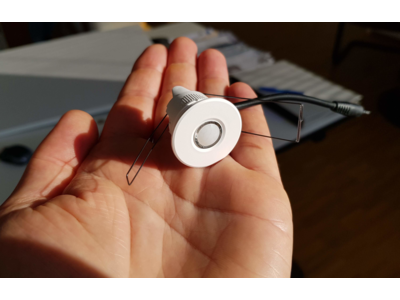There are 2 main ways depending on the type of unit and available interfaces:
1.) Switching the power supply
In case no other interface is available, the most basic way to switch an air conditioning unit or FCU is to simply switch off the power supply once the room is vacant.
While being highly effective in terms of energy savings, this approach comes with a couple of disadvantages.
To start with, the room might heat up significantly and then require a longer cool-down period when it is used again.
Secondly, there is no default behaviour for all kinds of A/C units once power is reapplied:
- some A/C units will resume operation in the last selected cooling mode and with the last set temperature
- other A/C units will simply go into standby and the user needs to manually reactivate the cooling operation. While this is the desired behaviour in some buildings, it does not score high in terms of user comfort.
In this case, the external sensor switches the power to the A/C units and needs to feature a relay that is sized to handle the load. Typically, 230V sensors will be used in this application.
2.) Using set-back interface for external controls
Fortunately, more and more A/C units as well as room thermostats today offer an input contact to which an external control, especially a sensor or a switch can be connected.
In many cases, these inputs are designed as potential free inputs.
The A/C or FC units (and/or external thermostats) can then be programmed to set back the set room temperature by a number of degrees when the room is vacant, e.g. +5°C. This means that the A/C will not go off completely but instead keep the room at a level from which it will cool down again quickly once the room is used again while still generating serious savings.
Typically in this scenario sensors such as ecos PM/24V/5T or occy can be used.




